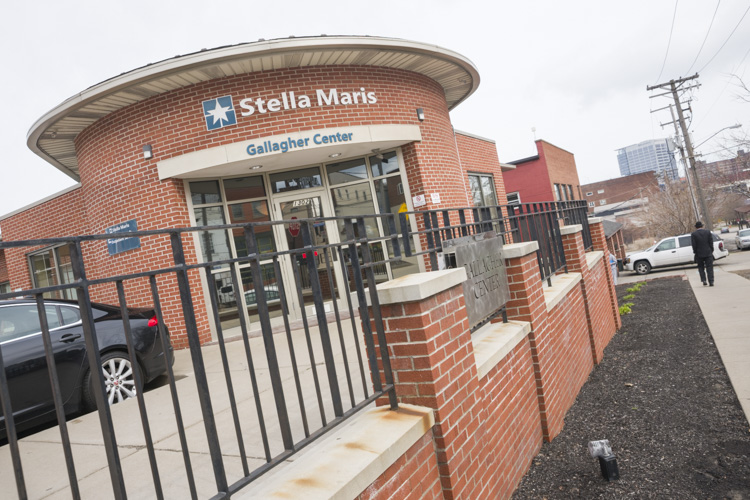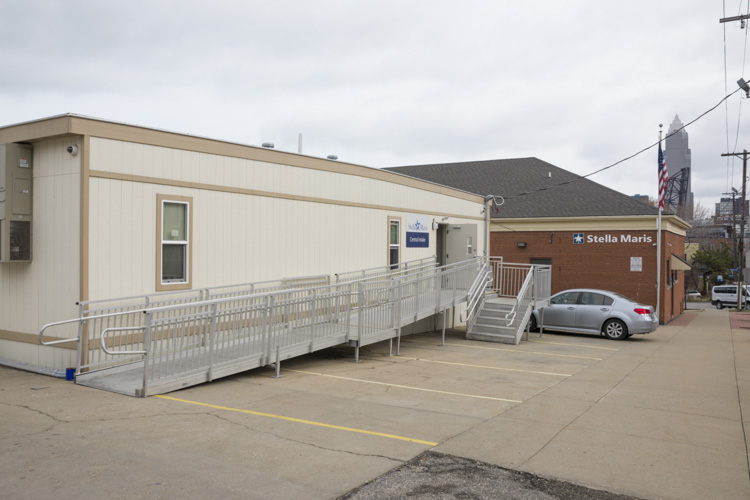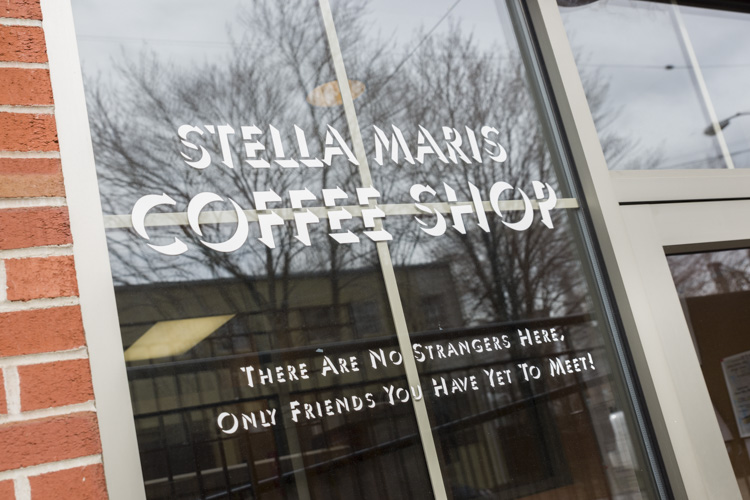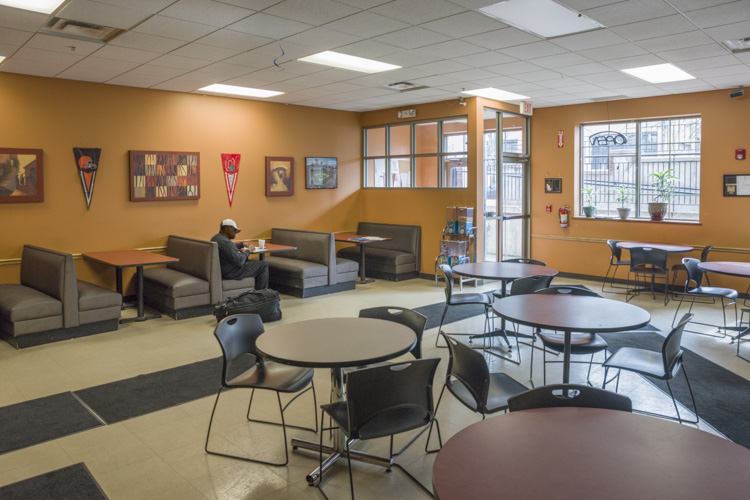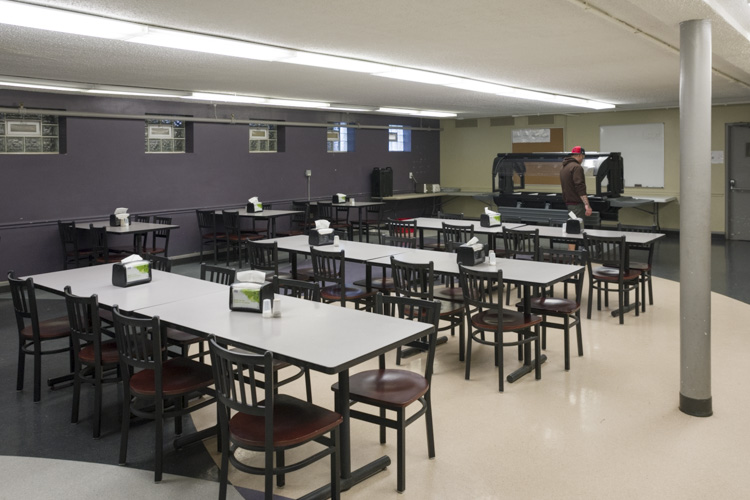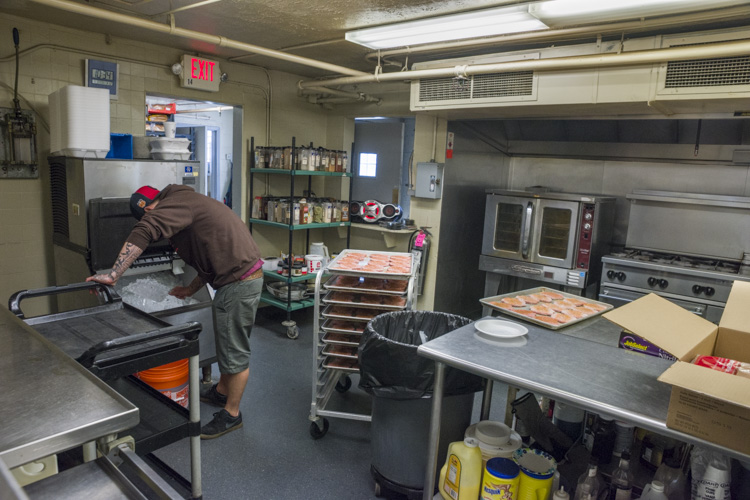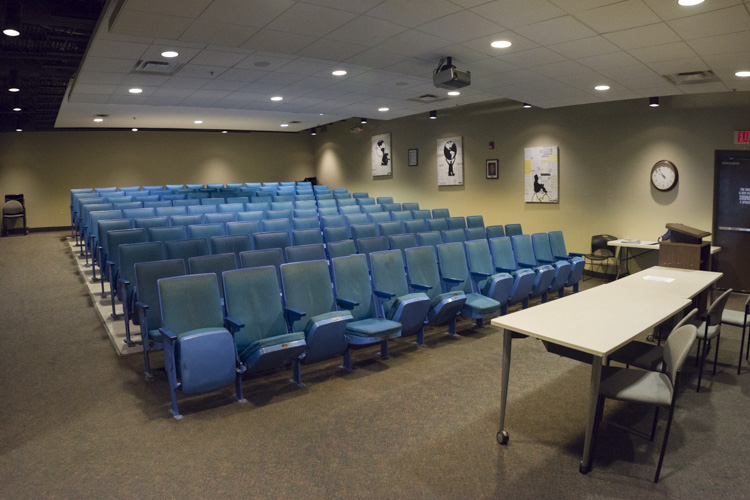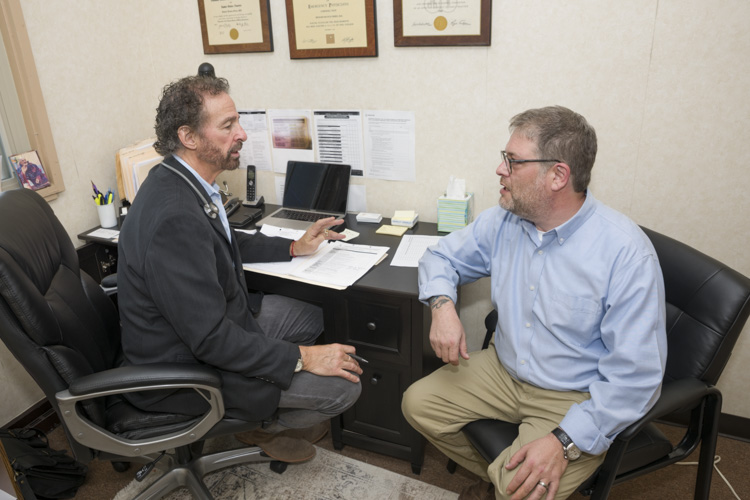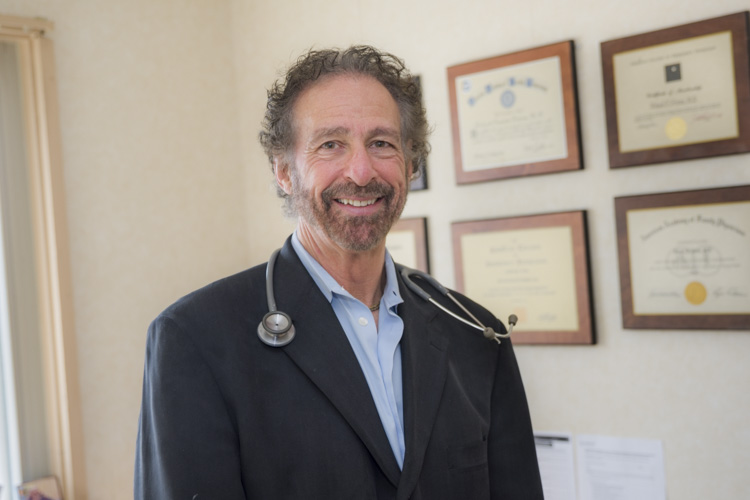
Opioid-related deaths in NEO have risen 125%. These two agencies are tackling the problem head-on.
Timothy Gerber started using Percocet and Adderall when he was 15 years old. By the time he was 21, Gerber was addicted to heroin. When he was 24, in February 2015, his mother died of a heroin overdose—and so began Gerber’s own road to recovery at Stella Maris, a drug and alcohol treatment center in Ohio City.
Gerber says he looked at his mom’s death as his own wakeup call to get treatment. “If she didn’t pass, I would have,” he shares. “It wasn’t a want, I had no choice. At that point, I was going to die and there was no other way out.”
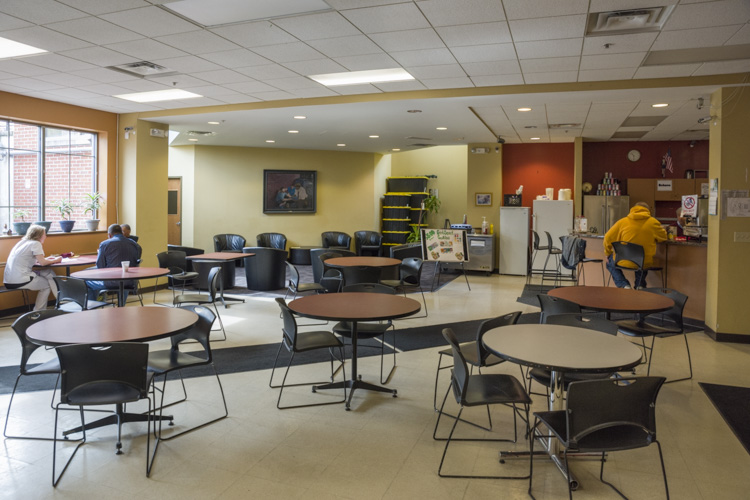 The Stella Maris Coffee Shop
The Stella Maris Coffee Shop
A relative, whom Gerber calls “his angel,” got him into Stella Maris, and he’s been sober since March 2015. In fact, Gerber is now a case manager for veterans in Stella Maris’ men’s on-campus dormitory for patients.
“My advice for someone who doesn’t know there’s help [is that] you just have to look for it,” says Gerber.
Though the use and abuse of opioids and synthetic opioids (which include heroin, fentanyl, and prescription painkillers like Percocet and oxycodone) is at epidemic levels across the country, Stella Maris’ executive director Daniel Lettenberger-Klein calls Cuyahoga County “one of the most devastated metro areas across the United States.”
To his point, opioid-related deaths in Northeast Ohio have increased by 125 percent since 2015, and that number is expected to continue to grow, according to a 2017 Stella Maris report.
“We’re doing everything we can,” says Allison Brandon, development coordinator for Stella Maris.
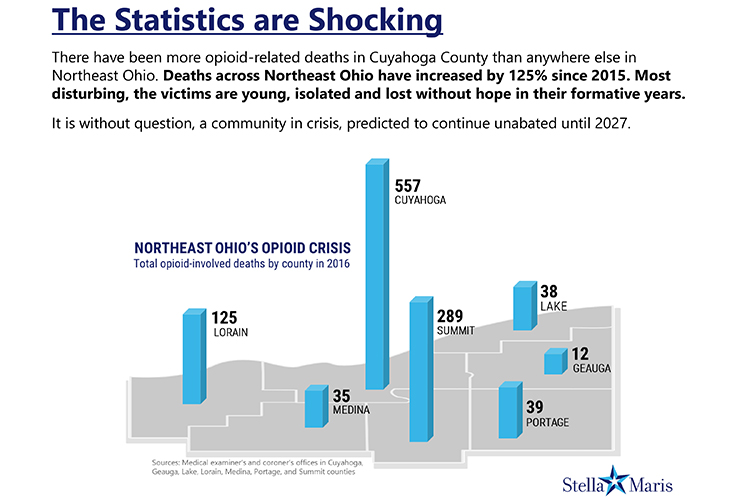
As treatment centers around the region work to combat the opioid epidemic and treat those affected before it’s too late, two local agencies are forging full speed ahead to combat the problem head-on. Stella Maris is expanding to accommodate the rising need for services, while Caritas Treatment and Wellness Center opened its doors in February 2019.
Prepared to care
Each week, more than 150 people—most of them men between 18 and 34—are on the Stella Maris waiting list to enter detox.
Stella Maris treats patients based on the American Society of Addiction Medicine (ASAM) care continuum—ranging from detox and a Partial Hospitalization Program (PHP), to an Intensive Outpatient Program (IOP), to a NIOP (Non-Intensive Outpatient Program) and sober living facilities. The center is one of only three detox programs in Cuyahoga County, along with Rosary Hall (at St. Vincent Charity Medical Center) and Salvation Army Harbor Light.
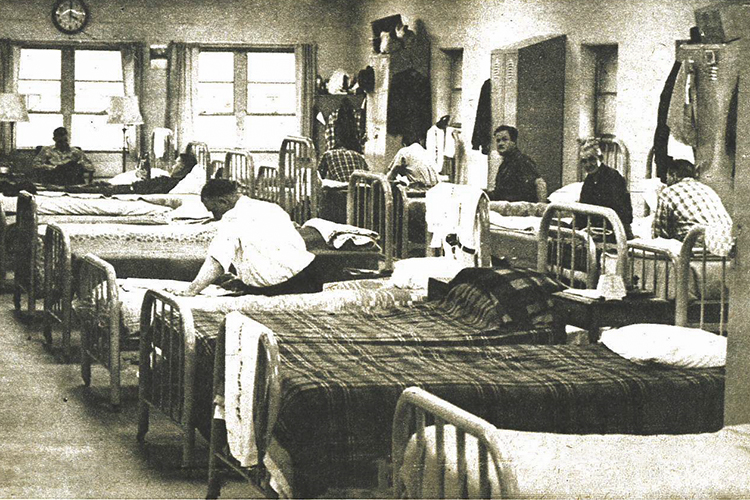 Old photo of the dorm room at Stella Maris in 1968
Old photo of the dorm room at Stella Maris in 1968
Patients in PHP stay in the sober living and dorms for two weeks, while IOP clients attend programming for three hours a day, four days a week, and NIOP meets once a week. Stella Maris typically hosts six groups a day, with 12 people per group, with 72 people in IOP and 46 living in the dorm. Nearly 1,200 people come through the facility each week for 12-step program meetings.
“We are the only free-standing [ASAM] 3.7 withdrawal management detox and the only treatment facility in Cuyahoga County with this extensive care continuum,” says Carole Negus, Stella Maris’ director of nursing.
Stella Maris does not turn away anyone, regardless of their insurance or inability to pay for services.
Raising capital
In response to the rising demand for addiction recovery, Stella Maris last year increased the detox unit from 16 beds to 20 beds—hoping to decrease time on the waiting list—but the organization is still stretched. When the detox unit expanded, staff counselors were relocated, and the intake department and PHP clients were moved to a trailer on campus. The organization also opened a women’s house off-campus, where the downstairs houses women in PHP and early IOP, and the upstairs serves as sober living.
The situation is a temporary fix, according to Brandon, so in February, Stella Maris launched a $5 million capital campaign to expand the facility and serve more than 2,000 additional people each year.
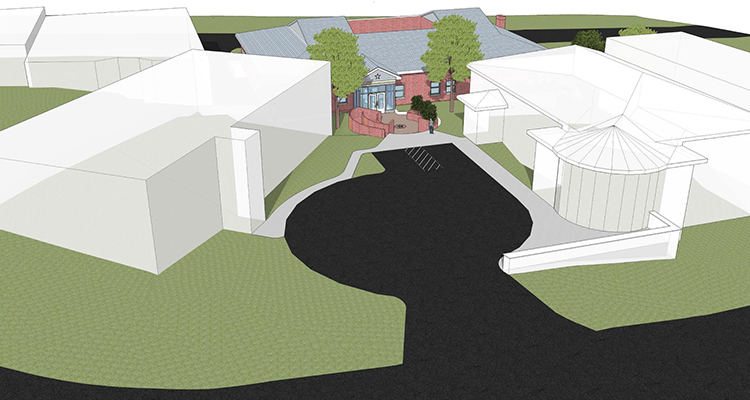 Aerial view rendering of the new treatment center on the Stella Maris Campus
Aerial view rendering of the new treatment center on the Stella Maris Campus
Stella Maris is halfway to their goal, says Brandon, and they are hoping to break ground by June. The ADAMHS Board of Cuyahoga County has funded the temporary expansion efforts, while the State of Ohio has contributed $750,000 to the capital campaign. The Stella Maris Board of Directors matched the state’s contribution.
The expanded facility will include a 12,000-square-foot detox facility, a centralized intake department, and the ability to keep rehab patients for an additional 30 days. The expansion will also include a wellness center with a gym, expanded gathering space for recovery meetings, and the renovation of existing facilities.
Brandon says no contribution is too small in this campaign. “My favorite kind of donation is when we get $10 from someone who says, ‘I’ve been sober for a year and Stella Maris saved my life,’” she says.
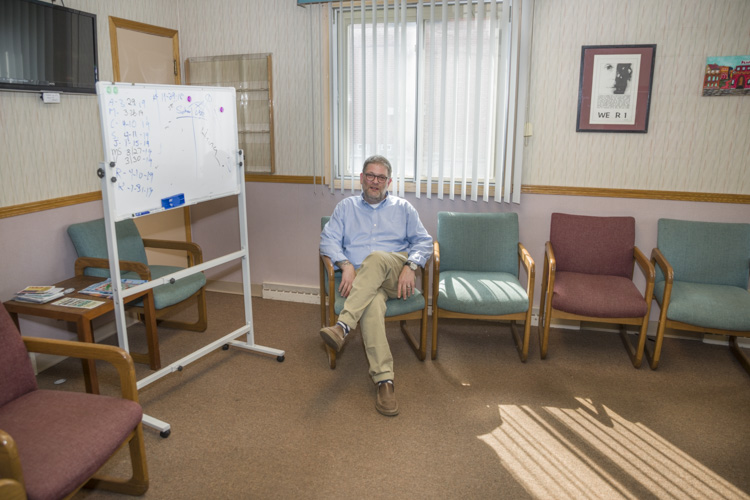 Drew Reimer in the group session room at Caritas Treatment and Wellness Center
Drew Reimer in the group session room at Caritas Treatment and Wellness Center
Life lessons lead to treatment resources
Like Gerber, Drew Reimer knows firsthand the devastating effects of drug use. After spending much of his teen and early adult years addicted to drugs, Reimer has now channeled his nearly 12 years of sobriety into opening Caritas Treatment and Wellness Center (4901 Turney Road in Garfield Heights).
The center, which opened this past February, takes a holistic approach to alcohol and drug addiction treatment through Medically Assisted Treatment (MAT), IOPs, and family counseling services. Reimer opened Caritas after helping establish three other programs in the area.
“We have a pretty good reputation in the field,” Reimer says. “I developed it by taking pieces of all the treatment centers I’ve been to. I took those different things and incorporated it into what I felt worked.”
Reimer's own story also informed his approach. By the age of 13, in the early 80s, Reimer was smoking pot. In high school, he moved on to harder drugs—cocaine and opioids—and was making prescription pads to forge prescriptions for painkillers.
By the early 90s, Reimer was using heroin, oxycodone, cocaine, and crack—smoking, snorting, or injecting the drugs. He was an addict; overdosed a couple of times; has been to inpatient and outpatient rehab programs several times; married, had a child, and divorced; and has been arrested.
“I was in and out so much it all starts to blur together,” he says of his rehab experiences.
Reimer faced drug charges in 2007, and judge Eileen T. Gallagher sentenced him to Cuyahoga County jail (where he says he continued to use). He then went to a Community Based Correctional Facility (CBCF).
While in CBCF, on July 25, 2007, Reimer had a heart attack at age 35, after which Gallagher once again sent him to jail. Reimer calls his life “a slow suicide” after his wife divorced him in 2004, but credits Gallagher with saving his life.
“She made decisions in terms of directing my life when I was incapable of making decisions on my own,” he says of Gallagher. “She knew if I stayed out longer, I’d be dead. She said, ‘You’re not a danger to anyone else, but you’re a danger to yourself.’”
No judgment
When Reimer was released from prison in January 2008, his mother picked him up and dropped him at the City Mission. “I had nowhere to go when I got out,” he recalls. “Then I went to Y Haven, and that was my last stop. I was growing up. I didn’t want to do it anymore.”
 Reimer has been sober since July 26, 2007. In addition to the longer treatment model, Reimer says Caritas staff are quick to respond to anyone who calls for help—Reimer can get them into the program within 24 hours in most cases—and he says they are sensitive to individual needs.
Reimer has been sober since July 26, 2007. In addition to the longer treatment model, Reimer says Caritas staff are quick to respond to anyone who calls for help—Reimer can get them into the program within 24 hours in most cases—and he says they are sensitive to individual needs.
“We meet the client where they are, not where we want them to be,” he says. “It’s the ability to connect with the patients, to step outside the script.”
But Reimer says the most important factor is making his clients feel accepted when they come to Caritas. “A lot of people come in feeling judged, full of shame, full of guilt,”says Reimer. “The idea is to get people in quickly, get them engaged as quickly as possible, and be accepting of whatever is going on in their lives.”
Caritas relies solely on word of mouth to market their program. For more information on Caritas, call (216) 633-1334.


